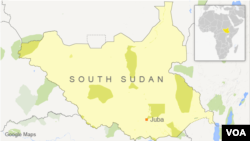More than 300 employees of Kenya Commercial Bank (KCB) across South Sudan have been on strike this week, demanding a sixfold pay increase to cover the soaring cost of living.
The staffers say they need the pay hike to keep up with increased prices for food and other basic needs, which have skyrocketed since the government devalued the South Sudanese pound against the U.S. dollar in December.
Bank customers said Tuesday that they had not been informed about the strike. Peter Mayen, a student preparing to attend the University of Bahr El-Ghazal this year, said he had come to the bank to withdraw money to pay his tuition fees.
Speaking in Arabic, Mayan said he would be in a tough position if the bank did not reopen.
“Now I am surprised, because when I came to get [money] from my account, it’s supposed to be done today, and if they’re not working today I don’t know really what I can do," he said. "If there is something happening, they should inform the people in advance.”
Rebecca Mail Limbo, 35, owns a restaurant across from the KCB bank in Wau. Many of her customers are bank employees. She estimated the strike was costing her 1,200 South Sudanese pounds per day.
Fewer customers
“I am also a victim. I have prepared food and everything is ready, but till now customers are not coming," she said. "When the bank is working, their customers are also my customers, so the closure of the bank has affected my business.”
Paul Ajok Garang, chairman of the South Sudanese national staff at the Kenyan Commercial Bank office in Juba, said the cost of living has increased to such an extent that salaries of bank employees do not come close to covering basic needs.
“We will continue [the strike] as long as the issue is not settled, because we are the majority in the bank and we do most of the work." he said. "The work of the bank is a relation management, and when you are not comfortable in your seat, you cannot manage that relation very well. But we are going to observe the labor laws that apply to employees and employer rights.”
Okej Ben Taban, head of the Nyakuron branch of KCB in Juba, said bank managers were aware of the national strike and were working to settle the issue as soon as possible.
Last week, officials in South Sudan’s Ministry of Labor asked nongovernmental organizations to adjust salaries of their national staff in order to avoid further turmoil across South Sudan.
The civil war has led to food shortages and displaced more than 2 million people, although the rival sides have started to implement a peace deal signed in August.




